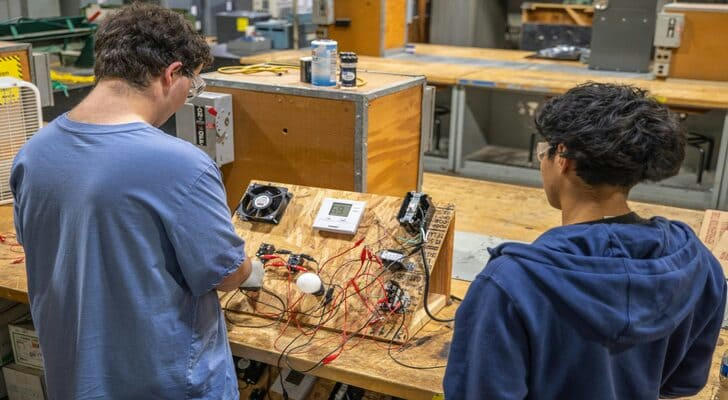Government-Supported HVAC Technician Training in Canada: A Strategic Pathway to High-Income Employment
In Canada’s evolving job market, HVAC technicians play a vital role in maintaining modern infrastructure. With over 10,000 annual job openings projected by 2033 and a nationwide shortage of 6,000 certified professionals, government-backed certification programs offer an accelerated route to stable, high-paying careers. These initiatives combine low-cost training, hands-on experience, and robust financial aid, enabling learners to secure roles with salaries ranging from $40,000 to $70,000 annually within months.

🔍 Why Choose Government-Supported HVAC Technician Programs?
Addressing Critical Industry Needs
Labor Shortage Crisis:
- The construction and maintenance sectors face a 6,000-person deficit of certified HVAC technicians (Employment and Social Development Canada).
- By 2030, 70% of existing technicians will retire, exacerbating the skills gap (Canadian HVACR Contractors Association).
Cost Efficiency:
- Tuition averages $2,000–$4,000, with government grants covering up to 90% for eligible learners.
- Example: Alberta’s Jobs and Skills Grant provides up to $10,000 for in-demand training (Government of Alberta).
Accelerated Career Entry:
- Programs range from 6–12 months, enabling rapid deployment into roles like HVAC technician (median salary: $55,000) or building systems manager ($85,000+ with experience).
Key Skills Acquired
Certification: Nationally recognized Red Seal endorsement for interprovincial mobility.
Technical Mastery: Proficiency in HVAC-R systems, refrigeration units, and smart thermostats.
Safety Compliance: Training in provincial regulations (e.g., WorkSafeBC standards).
🤑 Comprehensive Financial Support Framework
Federal and provincial programs eliminate financial barriers for learners:
| Program | Eligibility Criteria | Funding Details | Maximum Annual Aid |
|---|---|---|---|
| Canada Student Grant (CSG) | Full-time/part-time students | Up to $6,000/year (full-time) | $6,000 |
| Canada Training Credit (CTC) | Tax filers aged 25+ | $250/year toward tuition | $250 |
| Ontario’s Second Career Grant | Career changers | Covers tuition, living expenses, and childcare | $30,000+ |
| Alberta’s Jobs and Skills Grant | In-demand skill trainees | Up to $10,000 | $10,000 |
👩🏭 Targeted Learner Pathways
These programs cater to diverse career stages:
1. Recent Graduates (18–25)
Pathway: Leverage grants like CSG for debt-free training.
Example: Seneca College’s HVAC Technician Certificate combines online classes with internships at major construction firms.
2. Career Switchers (26–40)
Pathway: Transition from retail/hospitality via programs like BC’s StrongerBC Grant.
Example: A former hospitality worker transitioned to an HVAC technician role earning $52,000/year after completing NAIT’s diploma program.
3. Immigrants & Mature Learners (40+)
Pathway: Validate international credentials through Ontario’s Bridging Programs.
Example: An immigrant engineer in Calgary earned $60,000/year as an HVAC supervisor after completing NAIT’s bridging program.
🏢 Leading Accredited Institutions
1. Seneca College (Toronto, ON)
Offers HVAC Technician Certificate with internships at firms like EllisDon.
Funded by CSG and Ontario Student Assistance Program (OSAP).
2. Northern Alberta Institute of Technology (NAIT) (Edmonton, AB)
Delivers HVAC Diploma with co-op placements and $10,000 in grant support.
3. George Brown College (Toronto, ON)
Specializes in HVAC-R Systems with job placement rates exceeding 90%.
💼 Career Outcomes & Income Potential
Graduates achieve rapid career advancement:
Entry-Level Roles:
- HVAC Technician: Median salary $55,000 (PayScale).
- Commercial HVAC Installer: Up to 65,000/year.
Senior Roles:
Building Systems Manager: Average salary $85,000–$120,000 (Indeed).
Renewable Energy Specialist: $75,000+ in green technology sectors.
Case Study:
- Maria, a former administrative assistant in Calgary, completed NAIT’s program and now earns $62,000/year as an HVAC supervisor.

⚙️ Application Process Simplified
1. Verify Accreditation:
- Check programs via Red Seal for national recognition.
2. Apply for Grants:
- Submit CSG applications 6–8 weeks before enrollment.
3. Enrollment Steps:
Opt for hybrid learning (online + in-person) for flexibility.
Partnered employers offer $18–$25/hour internships (e.g., Carrier Canada).
❓ Frequently Asked Questions
Q: Do certifications expire?
A: Red Seal endorsements require renewal every 5 years via continuing education.
Q: Are there age limits?
A: No—programs welcome learners of all ages, including retirees seeking part-time roles.
Q: Can I work while studying?
A: Yes! Institutions like Bow Valley College offer evening and weekend classes.
📈 Conclusion: Seize Canada’s HVAC Opportunity
With zero tuition debt, immediate employment prospects, and salaries exceeding $70,000, government-supported HVAC programs are ideal for career transformation. The sector’s resilience—insulated from automation and recession—makes it a strategic choice for long-term financial stability.
Data Sources
- Job Outlook: Employment and Social Development Canada
- Salary Data: PayScale HVAC Technician Report
- Grant Programs: Canada Student Grants
- Institutional Profiles: Maclean’s University Rankings
